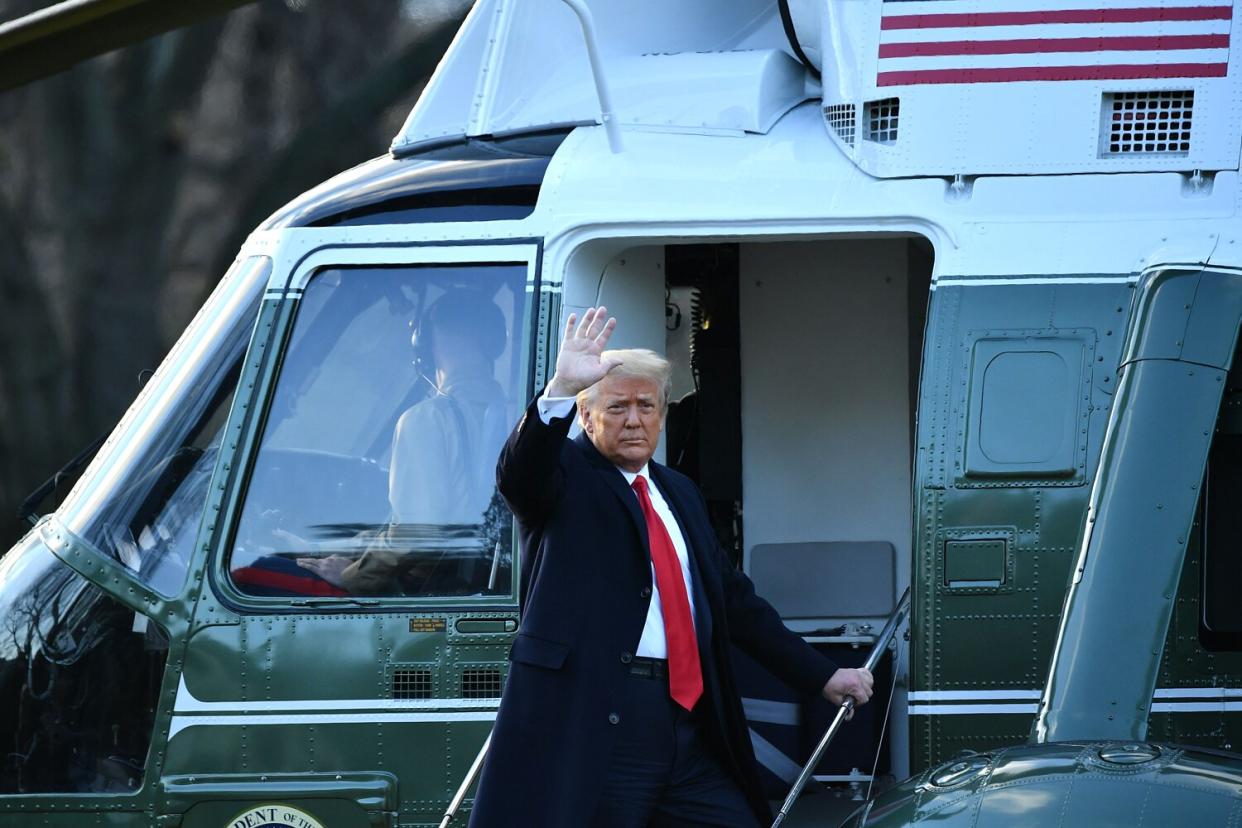Donald Trump's Impeachment Defense Team Takes Shape Ahead of His February Trial

- Oops!Something went wrong.Please try again later.
MANDEL NGAN/AFP via Getty Images President Donald Trump waves as he boards Marine One at the White House in Washington, D.C., on Wednesday.
As Donald Trump's unprecedented second impeachment trial grows closer, the former president's defense team is taking shape.
He has tapped five lawyers, according to CNN.
South Carolina defense attorney Butch Bowers will lead along with South Carolina attorneys Johnny Gasser and Greg Harris, as well as North Carolina defense attorney Joshua Howard. Deborah Barbier, also of South Carolina, was previously brought on, CNN reported.
The four South Carolina attorneys are described as the "nucleus" of Trump's defense, according to The State newspaper.
Bowers, an Air National Guard colonel-turned-attorney calling himself the "anchor tenant" of the defense, told The Washington Post he did not balk at working on the trial, though other lawyers had reportedly declined.
"It's who I am. It's what I do. It's all about the rule of law in the Constitution," he said. (Notably, Trump's personal attorney Rudy Giuliani is not involved.)
Trump's Senate trial is slated to open the week of Feb. 8, when lawmakers will begin deliberating and deciding whether to convict him for inciting the Jan. 6 riot at the U.S. Capitol, in which five people died and lawmakers were temporarily forced into hiding.
Ten Republicans in the House of Representatives voted to impeach Trump earlier this month — the most impeachment votes a president has ever received from their own political party.
Despite the diminished GOP support for Trump, the former president is widely expected to be acquitted at this trial as he was the first time, when the Republican-led majority voted against convicting the president for his role in the Ukraine scandal.
Seventeen Republicans would need to vote to convict Trump along with the 50 Democratic senators.
But in a sign of his enduring support even from lawmakers who criticized his behavior in the rioting, 45 of GOP's senators unsuccessfully voted against holding a trial, claiming it was unconstitutional.
Trump, now indefinitely living at his private Florida club, has been focused on his latest impeachment defense, sources tell PEOPLE.
"He will spend coming weeks working on his impeachment trial and listening to advisers on a variety of issues," one source has said. "I think it will be a while before he decides his next steps."
RELATED: How Donald Trump Spent His First Week as a Former President: Golf, Silence and Impeachment Prep
Harris told CNN that Bowers is "putting it together" and "making assignments" for the team. "We've got a lot of work to do," Harris said. (Bowers did not immediately respond to a request for comment on Friday.)
Trump is likely to see some Republicans join their Democratic Party colleagues in voting to convict, even if two-thirds of the chamber does not do so.
If convicted, a majority of the Senate could vote to bar Trump from ever holding federal office again.
RELATED: Donald Trump Launches 'Office of the Former President' from Mar-a-Lago as He Faces Uncertain Future
Still, a conviction seems distant even as some Republicans signaled that their vote to stop the trial did not necessarily mean they couldn't be persuaded about Trump's guilt.
"I think this was indicative of where a lot of people's heads are," Republican Sen. John Thune said after the preliminary vote on Tuesday, according to the Associated Press.
Nonetheless, Senate Majority Leader Chuck Schumer said this week: "Make no mistake, there will be a trial, and the evidence against the former president will be presented in living color for the nation and every one of us to see once again."
"We will all watch what happened. We will listen to what happened, and then we will vote," Schumer said. "We will pass judgment as our solemn duty under the Constitution demands. And in turn, we will all be judged on how we respond."

